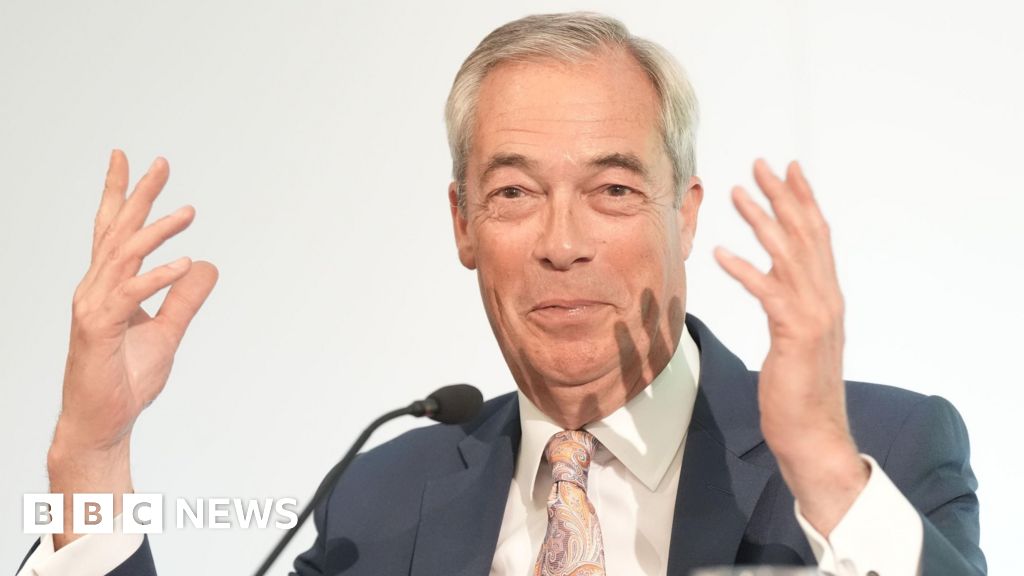Reform UK has announced it would give non-doms the chance to avoid many UK taxes by paying a £250,000 fee, with the proceeds going to people on the lowest incomes. Non-domiciles (or non-doms) live in the UK but have a permanent home overseas for tax purposes. Under Reform's plan, non-doms would pay the fee for a new Britannia Card and in return not be taxed on wealth, income or capital gains earned abroad. They would also avoid the need to pay inheritance tax. Labour Chancellor Rachel Reeves said the measure amounted to a "tax cut for foreign billionaires" and Reform would have to either raise taxes or cut public services such as the NHS to compensate for the loss in revenue. Speaking in central London, Reform UK leader Nigel Farage said "tens of thousands" of people would be tempted to the UK by the offer of the card, which would be renewable every 10 years. "Many talented people are leaving and we want as many entrepreneurs, as many risk-takers, as many job creators, as many people paying lots of tax, as many people investing huge sums of money." Asked if the policy was an example of "fantasy economics", he said the initial £250,000 payment would be "just the tip of the iceberg of what these people will pay if they come back" in stamp duty and VAT in the UK. Questioned on whether an influx of wealthy people would push up property prices in London, he said it was a "good point" but argued there would not be an impact on the cost of affordable housing. Reform UK says income from the measure would be transferred annually tax-free to the bank accounts of the lowest paid 10% of full-time workers. The party estimates its policy would raise between £1.5bn to £2.5bn annually, equating to £600 - £1,000 per low-paid worker. Last year, the Labour government announced it would be abolishing the tax status, which allows non-doms to only pay UK tax on money they earn in the country. The so-called loophole meant wealthy individuals were able to legally save money by choosing a lower-tax country as their permanent home. Earlier this year, Chancellor Rachel Reeves said that, having listened to "concerns that have been raised by the non-dom community", she would introduce a more generous transition phase to the policy. There are reports she is considering watering down the policy further after claims it has triggered an exodus of wealthy people from the UK. The government says its package of measures would raise £12.7bn over the next five years. Under previous rules, non-doms paid an annual fee of £30,000 or £60,000 depending on how much time they had spent in the UK. According to HMRC figures, 74,000 people claimed non-dom status in 2022-23. Responding to the Reform UK policy, a Labour spokesperson said: "Nigel Farage can brand this whatever he wants - the reality is his first proper policy is a golden ticket for foreign billionaires to avoid the tax they owe in this country. "As ever with Reform, the devil is in the detail. This giveaway would reduce revenues raised from the rich that would have to be made up elsewhere - through tax hikes on working families or through Farage's promise to charge them to use the NHS." Conservative shadow chancellor Mel Stride said: "The British public need a real plan for putting more money in their pockets - but what Reform are peddling is fantasy economics. Their promises are ruinously irresponsible. "Only Kemi Badenoch and the Conservatives believe in the fiscal responsibility our country needs."
Let non-doms pay £250,000 and avoid UK tax, says Farage
TruthLens AI Suggested Headline:
"Reform UK Proposes £250,000 Fee for Non-Doms to Avoid UK Taxes"
TruthLens AI Summary
Reform UK has put forth a new proposal that would allow non-domiciles (non-doms) residing in the UK to avoid a range of UK taxes by paying a one-time fee of £250,000. This payment would grant them access to a ‘Britannia Card’, which exempts them from taxes on wealth, income, and capital gains earned abroad, as well as from inheritance tax. The proceeds from this initiative are intended to benefit the lowest-income earners in the UK, with estimates suggesting that it could generate between £1.5 billion to £2.5 billion annually. The party's leader, Nigel Farage, claims that the initiative would attract “tens of thousands” of talented individuals and entrepreneurs to the UK, stimulating economic growth. Critics of the policy, including Labour Chancellor Rachel Reeves, have labeled it a “tax cut for foreign billionaires,” warning that it could lead to significant revenue losses that would necessitate tax increases or cuts to essential public services like the NHS.
The controversy surrounding the non-dom tax status has intensified, especially after the Labour government announced plans to abolish it, which previously allowed wealthy individuals to pay UK tax only on domestic earnings. The current government is proposing measures expected to raise £12.7 billion over the next five years, while addressing concerns from the non-dom community. Despite the potential influx of wealthy individuals, there are fears that such a policy could escalate property prices in London, although Farage contends that it would not affect affordable housing. Labour representatives have criticized the Reform UK plan as providing a loophole for the wealthy to evade their tax obligations, emphasizing that it could lead to increased financial burdens on working families. Conservative shadow chancellor Mel Stride echoed these sentiments, referring to the proposals as ‘fantasy economics’ that lack the fiscal responsibility necessary for the nation's economic health.
TruthLens AI Analysis
You need to be a member to generate the AI analysis for this article.
Log In to Generate AnalysisNot a member yet? Register for free.
